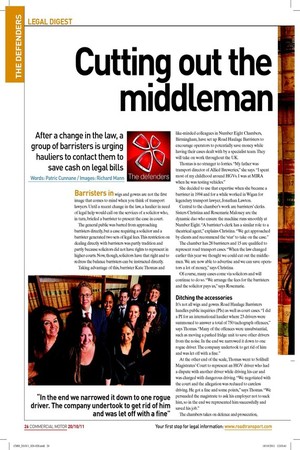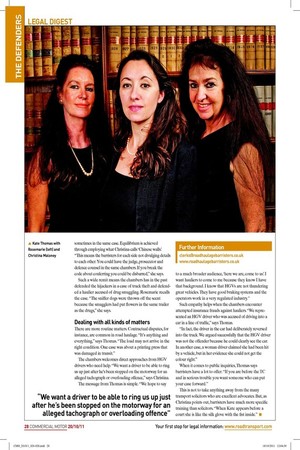Cutting out the middleman
Page 18

Page 20

If you've noticed an error in this article please click here to report it so we can fix it.
After a change in the law, a group of barristers is urging hauliers to contact them to save cash on legal bills
Words: Patric Cunnane / Images: Richard Mann Barristers in wigs and gowns are not the irst image that comes to mind when you think of transport lawyers. Until a recent change in the law, a haulier in need of legal help would call on the services of a solicitor who, in turn, briefed a barrister to present the case in court.
The general public was barred from approaching barristers directly, but a case requiring a solicitor and a barrister generated two sets of legal fees. This restriction on dealing directly with barristers was partly tradition and partly because solicitors did not have rights to represent in higher courts. Now, though, solicitors have that right and to redress the balance barristers can be instructed directly.
Taking advantage of this, barrister Kate Thomas and like-minded colleagues in Number Eight Chambers, Birmingham, have set up Road Haulage Barristers to encourage operators to potentially save money while having their cases dealt with by a specialist team. They will take on work throughout the UK.
Thomas is no stranger to lorries. “My father was transport director of Allied Breweries,” she says. “I spent most of my childhood around HGVs. I was at MIRA when he was testing vehicles.” She decided to use that expertise when she became a barrister in 1994 and for a while worked in Wigan for legendary transport lawyer, Jonathan Lawton.
Central to the chamber’s work are barristers’ clerks. Sisters Christina and Rosemarie Maloney are the dynamic duo who ensure the machine runs smoothly at Number Eight. “A barrister’s clerk has a similar role to a theatrical agent,” explains Christina. “We get approached by clients and recommend the ‘star’ to take on the case.” The chamber has 28 barristers and 15 are qualiied to represent road transport cases. “When the law changed earlier this year we thought we could cut out the middlemen. We are now able to advertise and we can save operators a lot of money,” says Christina.
Of course, many cases come via solicitors and will continue to do so. “We arrange the fees for the barristers and the solicitor pays us,” says Rosemarie.
Ditching the accessories
It’s not all wigs and gowns. Road Haulage Barristers handles public inquiries (PIs) as well as court cases. “I did a PI for an international haulier where 23 drivers were summoned to answer a total of 750 tachograph offences,” says Thomas. “Many of the offences were unsubstantial, such as moving a parked fridge unit to save other drivers from the noise. In the end we narrowed it down to one rogue driver. The company undertook to get rid of him and was let off with a ine.” At the other end of the scale, Thomas went to Solihull Magistrates’ Court to represent an HGV driver who had a dispute with another driver while driving his car and was charged with dangerous driving. “We negotiated with the court and the allegation was reduced to careless driving. He got a ine and some points,” says Thomas. “We persuaded the magistrate to ask his employer not to sack him, so in the end we represented him successfully and saved his job.” The chambers takes on defence and prosecution, sometimes in the same case. Equilibrium is achieved through employing what Christina calls ‘Chinese walls’. “This means the barristers for each side not divulging details to each other. You could have the judge, prosecutor and defence counsel in the same chambers. If you break the code about conferring you could be disbarred,” she says.
Such a wide remit means the chambers has in the past defended the hijackers in a case of truck theft and defended a haulier accused of drug smuggling. Rosemarie recalls the case. “The sniffer dogs were thrown off the scent because the smugglers had put lowers in the same trailer as the drugs,” she says.
Dealing with all kinds of matters
There are more routine matters. Contractual disputes, for instance, are common in road haulage. “It’s anything and everything,” says Thomas. “The load may not arrive in the right condition. One case was about a printing press that was damaged in transit.” The chambers welcomes direct approaches from HGV drivers who need help. “We want a driver to be able to ring us up just after he’s been stopped on the motorway for an alleged tachograph or overloading offence,” says Christina.
The message from Thomas is simple. “We hope to say










































